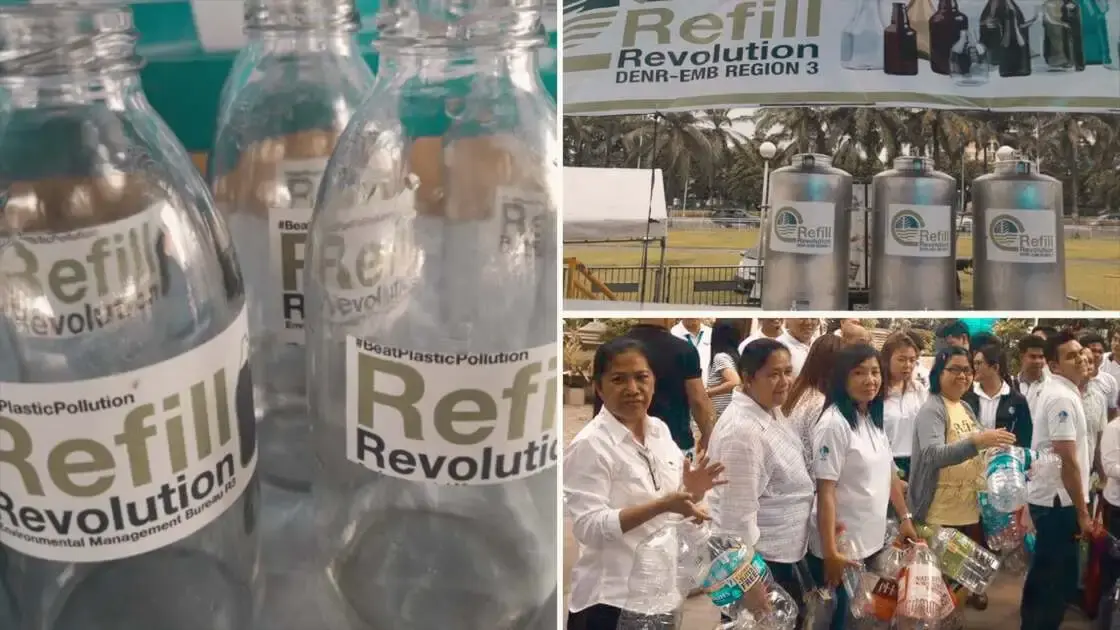
Filipinos continue to take a stand for sustainability as the Refill Revolution, an initiative that encourages individuals to reuse plastic bottles, is in full swing.
The movement aims to reduce Filipinos’ dependence on disposable plastic packaging, giving incentives to individuals who reuse bottles and other receptacles. Through the project, people can buy kitchen condiments and cleaning products at a lower cost as long as use their own containers.
The Refill Revolution initiative was first launched by the Department of Environmental and Natural Resources’ Environmental Management Bureau (EMB) in Central Luzon back in 2018. The first refilling event was conducted in Guiguinto, Bulacan, which prevented the creation of 16 tons of plastic waste.
EMB Central Luzon said that from 2018 to 2019, the project’s events refilled 94,500 liquid products; if not for the campaign, the products would have taken up 472,500 pieces of 200ml sachets. During this period, the 9 legs of the Refill Revolution project saw the installation of refill stations in Bocaue, Bulacan; San Fernando, Pampanga; Balanga, Bataan; and Baler, Aurora, among others.
The practice of refilling is common among zero-waste advocates in the country. For example, community pantries in 2021 encouraged people to bring their own reusable bottles and containers to refill vinegar, soy sauce, and other necessities. Even alcohol refilling stations were set up at local drug stores at the height of the COVID-19 pandemic.
Several industry partners have heeded the call of EMB, with NutriAsia and Glochem Marketing and Recycling Corporation participating in refill events. The most recent refilling fair on June 13, 2023, saw about 1,000 people flock to San Fernando, Pampanga’s covered court. Participants were able to buy NutriAsia’s Datu Puti vinegar and soy sauce, as well as its Golden Fiesta cooking oil; meanwhile, Glochem Marketing and Recycling Corporation provided detergent powder, fabric conditioner, and dishwashing liquid refills.
Specifically, the Refill Revolution aims to combat the sachet-based economy in the Philippines. “Sachet economy refers to the practice, especially in poorer communities, of buying consumer products – such as detergent, shampoo, powdered milk, or beverages – in single-use packages. The products are packaged in small, disposable plastic bags called sachets,” EMB Central Luzon Region explained in a Facebook post.
Sadly, the usage of sachets is prevalent throughout the country. A 2019 study by the Global Alliance for Incinerator Alternatives found that 60 billion sachets are used in the Philippines every year; if not disposed of properly, they travel to drainage systems, rivers, and seas. The country is also the third largest generator of plastic trash in the world.
Excited to make a difference? Check the Facebook page of EMB Central Luzon for updates on the next refill event near you. The link is in the tweet below.
Be a part of @DENROfficial’s Refill Revolution in Central Luzon! See how you can refill your plastic containers with low-cost food and cleaning products
Interested? Stay tuned for updates on this Facebook page: https://t.co/4jC08o8M3K@GoodNewsPinas_ pic.twitter.com/qAS6wMLVEg
— Summer Sanares (@scvannasummer) September 17, 2023
Filipinos have explored many different ways to repurpose plastic. In 2020, startup company Closing The Loop Technologies helped communities upcycle plastic wastes into materials for high-value products. In 2021, a recycling facility in Ilocos Norte built eco-bricks from plastic waste and discarded materials.
Don’t let this good news stop with you! Help spread the word about the Refill Revolution and its positive impact on both the environment and your wallet. Share this article with your friends, family, and community to encourage more Filipinos to take part in this sustainable movement.
Good News Pilipinas is a Lasallian Scholarum Awardee. TELL US your good news story tips by messaging GoodNewsPilipinas.com on Facebook, Twitter, or Instagram, or e-mailing editor@goodnewspilipinas.com
The post Refill Revolution: How Filipinos are Curbing Plastic Waste and Saving Money in the Process appeared first on Good News Pilipinas.
Source: Good News Pilipinas
0 Comments